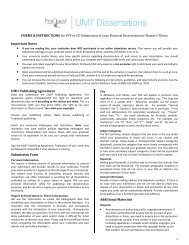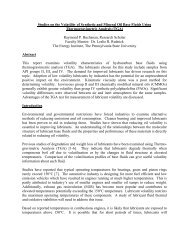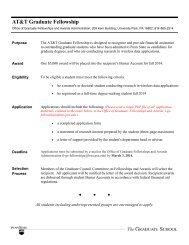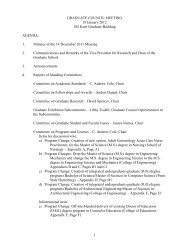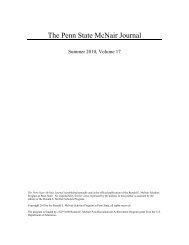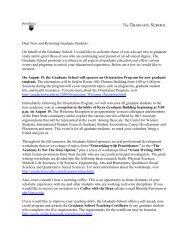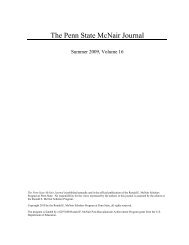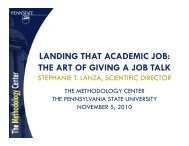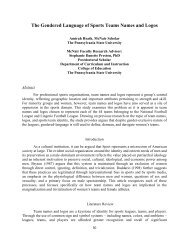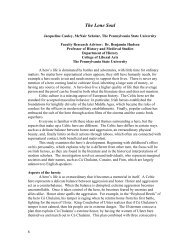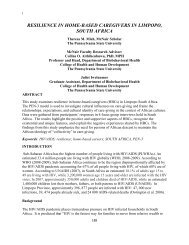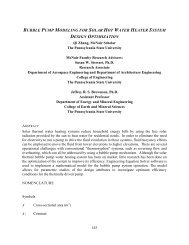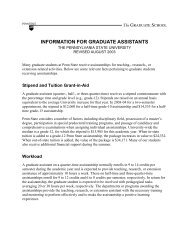1 GRADUATE COUNCIL MEETING 9 May 2012 102 Kern Graduate ...
1 GRADUATE COUNCIL MEETING 9 May 2012 102 Kern Graduate ...
1 GRADUATE COUNCIL MEETING 9 May 2012 102 Kern Graduate ...
Create successful ePaper yourself
Turn your PDF publications into a flip-book with our unique Google optimized e-Paper software.
B6<br />
Current Policy on Doctoral Committees, approved by <strong>Graduate</strong> Council in<br />
<strong>May</strong> 2011 and excerpted on 4/1/<strong>2012</strong> from:<br />
http://bulletins.psu.edu/bulletins/whitebook/degree_requirements.cfm<br />
and<br />
http://bulletins.psu.edu/bulletins/whitebook/degree_requirements.cfm?section=degreeReq1<br />
“ADVISERS AND DOCTORAL COMMITTEES<br />
Following admittance to a degree program, the student should confer with the head of that major<br />
department or program concerning procedures and the appointment of an academic adviser.<br />
Consultation or arrangement of the details of the student's semester-by-semester schedule is the<br />
function of the academic adviser. This person may be a member of the doctoral committee or<br />
someone else designated by the head of the major program for this specific duty. The academic<br />
adviser may be different from the dissertation adviser.<br />
Doctoral Committee--General guidance of a doctoral candidate is the responsibility of a<br />
doctoral committee consisting of four or more active members of the <strong>Graduate</strong> Faculty, which<br />
includes at least two faculty members in the major field. The dissertation adviser must be a<br />
member of the doctoral committee. The dissertation adviser usually serves as chair, but this is<br />
not required. If the candidate is also pursuing a dual-title field of study, a co-chair representing<br />
the dual-title field must be appointed. In most cases, the same individual (e.g., dissertation<br />
adviser) is a member of the <strong>Graduate</strong> Faculty in both the major and dual-title fields, and in such<br />
cases may serve as sole chair. At least one regular member of the doctoral committee must<br />
represent a field outside the candidate’s major field of study in order to provide a broader range<br />
of disciplinary perspectives and expertise. This committee member is referred to as the “Outside<br />
Field Member.” In cases where the candidate is also pursuing a dual-title field of study, the dualtitle<br />
representative to the committee may serve as the Outside Field Member. If the candidate has<br />
a minor, that field must be represented on the committee by a “Minor Field Member.” (See also<br />
Major Program and Minor Field under D.Ed.—Additional Specific Requirements in this<br />
bulletin.) This committee is appointed by the graduate dean through the Office of <strong>Graduate</strong><br />
Enrollment Services, upon recommendation of the head of the major program, soon after the<br />
student is admitted to candidacy. The dean may on occasion appoint one or more members of the<br />
committee in addition to those recommended by the program chair. A person not affiliated with<br />
Penn State who has particular expertise in the candidate's research area may be added as a<br />
“Special Member,” upon recommendation by the head of the program and approval of the<br />
graduate dean (via the Office of <strong>Graduate</strong> Enrollment Services). A Special Member is expected<br />
to participate fully in the functions of the doctoral committee. If the Special Member is asked<br />
only to read and approve the doctoral dissertation, that person is designated a special signatory.<br />
Occasionally, special signatories may be drawn from within the Penn State faculty in particular<br />
situations.



